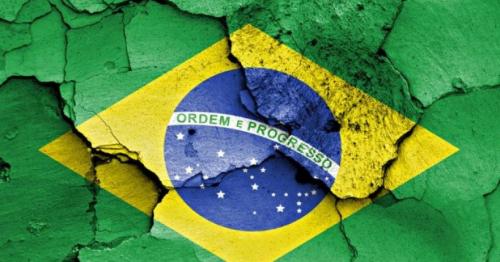The Brazilian crisis: part of the global crisis
Neoliberal politics, established all over the world, gave free rein to the great corporations to accumulate all they could. Wall Street's motto was and still is: greed is good.
- Opinión

Brazil can not be analyzed by thinking only about Brazil. No country, not even the isolated North Korea, is excluded from the international connections unavoidably created by globalization. Moreover, Brazil is the sixth largest economy in the world, which arouses the greed of the large corporations that want to come to Brazil, not to help with our inclusive development, but to accumulate more and more, given the size of our domestic market and the super abundance of our commodities, natural goods and services, which are ever more necessary to sustain the consumerism of the opulent countries.
Three names must be remembered, because they have shaped the present ecomonic framework and the politics of the world. The first name is without doubt Karl Polanyi, who back in 1944 observed "The Great Transformation" that was taking place in the world. From a market economy we were transitioning to a market society. That is, everything is for sale, even the most sacred things. Money is made from everything, which in his The Poverty of Philosophy, Marx called the great corruption and general venality. Even human organs, truth, conscience, and knowledge have been transformed into sources of profit. Everything follows the logic of capitalism: of competition, rather than solidarity, which causes societies to tear themselves apart in ferocious fights among industries.
Two other names must be mentioned: Margaret Thatcher and Ronald Reagan. Due to the erosion of true socialism, capitalism emerged victorious, without the restrictions imposed by the restraints exerted by the socialist mode of production. Capitalism could now freely follow its individualistic logic of accumulation and consumerism. Thatcher firmly asserted that society does not exist: only individuals struggling against each other. Reagan advocated total market freedom, the reduction of the State privatization of national goods. It was the triumph of neoliberalism. Previously, with liberalism, using a metaphor, the table was set. The wealthy occupied it first and satiated themselves. The others found places somewhere in a corner of the table. But they were at the table. With neoliberalism, the table is set, but only those who can pay can participate. The others fight the dogs for a place under the table for the crumbs.
Neoliberal politics, established all over the world, gave free rein to the great corporations to accumulate all they could. Wall Street's motto was and still is: greed is good. The drive to accumulate has resulted in a few persons controlling a great part of the wealth of the world, creating an ocean of poor, miserable and starving people. Since the capitalist culture knows neither compassion nor solidarity, but only competition and the supremacy of the strongest, the world has developed a level of barbarity rarely seen in history.
From my point of view, capitalism as a mode of production and its political ideology, neoliberalism, have reached their end, in two senses. They have accomplished their end, that is, their objective-end: supreme accumulation. And they approach their end, as finality and extinction. Not because we want it, but because the Earth, with her limited goods and services, largely non-renewable, cannot support such unlimited usage indefinitely. The Earth herself will make it impossible. Either the mode of production and consumption will change, or it will be condemned to disappear. Since it lacks a sense of belonging, and treats nature as a mere thing to be uncontrollably exploited, it will continue on a path of no return, endangering the life-system and our very Common Home, that could become inhabitable.
In the theoretical basis of the Brazilian neoliberals, those who accomplished the coup and developed "The Bridge to the Future" (A Bridge to Failure), are possessed, without a trace of conscience or critique, by that bad neoliberal dream. They want a Brazil only for themselves, as a degraded province, attached to and dependent on the great Capitalist empire. That is our ruin and our disgrace. It prolongs dependency and the colonial logic.
The path of a country that had begun to take the first steps towards her re-founding, on other bases, values and principles, with her eyes wide open and her hands engaged in the politics of human development with social inclusion, has been shamelessly aborted. Here rests our true crisis, that involves all the particulars.
But what must be has strength. Therefore we hope and believe that we will overcome this painful journey on behalf of the vast majority, actually, of everyone. We will shine. In dark times such as ours, the poet sang: “It is dark; but I sing!”. Imitating him, I say: “in the midst of uncertainty we still dream, and it is a good dream, that foretells a beneficial reality for all”.
06-07-2018
- Leonardo Boff, Eco-Theologian-Philosopher, Earthcharter Commission.
(Free translation from the Spanish sent by Melina Alfaro, alfaro_melina@yahoo.com.ar. Done at REFUGIO DEL RIO GRANDE, Texas, EE.UU.)
Del mismo autor
- O risco da destruição de nosso futuro 05/04/2022
- Reality can be worse than we think 15/02/2022
- ¿Hay maneras de evitar el fin del mundo? 11/02/2022
- Há maneiras de evitar o fim do mundo? 08/02/2022
- The future of human life on Earth depends on us 17/01/2022
- El futuro de la vida depende de nosotros 17/01/2022
- A humanidade na encruzilhada: a sepultura ou… 14/01/2022
- “The iron cage” of Capital 04/01/2022
- Ante el futuro, desencanto o esperanzar 04/01/2022
- Desencanto face ao futuro e o esperançar 03/01/2022








